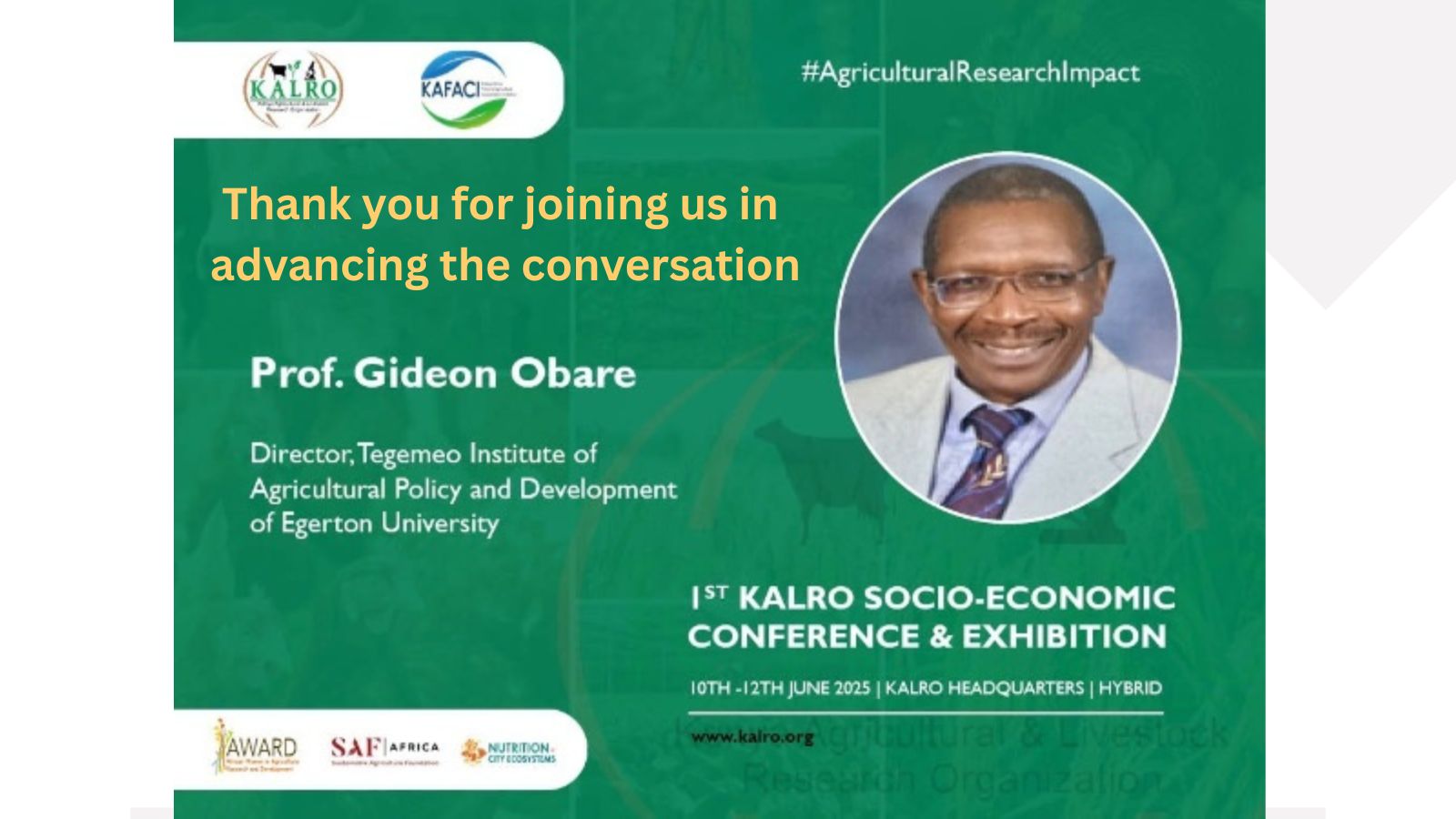
TRANSFORMING FOOD SYSTEMS: A CALL TO ACTION FOR AGRICULTURAL STAKEHOLDERS
I was truly honoured to speak at the 1st KALRO Socio-Economic and Policy Development Conference, where the theme—building resilient food systems through socio-economic and policy research—couldn’t be more relevant to the times we’re living in. My presentation, “Transforming Food Systems: Research Methods and Data Analysis for Resilience,” laid out what I believe are the crucial next steps for building agricultural systems that can stand up to today’s challenges.
Let’s be honest about where we are. We’re operating in a world that looks very different from the one previous generations knew. Climate change is no longer a future worry—it’s right here with us, disrupting our growing seasons and making weather patterns unpredictable. On top of that, global events—conflicts, pandemics—send shockwaves through our markets and drive up prices. At the same time, our populations are growing, and eating habits are changing, putting even more strain on our land and resources.
The truth is, how we’ve always done things isn’t enough anymore. If we’re going to overcome these challenges, we need to do more than tinker at the edges. We need a transformation which must be grounded in solid evidence.
To fellow researchers:
The work you do is the bedrock on which everything else is built. Now, more than ever, we need to raise our standards. It’s time to move beyond simply describing what’s happening and start showing, with confidence, what actually works. If we can’t run proper experiments, let’s ensure we use the strongest alternative methods. Policymakers and farmers must trust that our findings will hold up in the real world.
Let’s also make the most of the new tools at our disposal. Things like satellite imagery and digital data can help us see the bigger picture and spot trends we might otherwise miss. But we must remember that these are just tools—they don’t replace human judgment, and we must ensure everyone can benefit, not just those with access to the latest technology.
We also have to think about the whole system, not just one part of it. Our models and analyses should help us see how changes in one area ripple out to others, so we can avoid unintended consequences and make smarter choices from the start.
To academic institutions:
You have a special role to play in bringing people together. Encourage your teams to work across disciplines and with partners outside the university—especially those closest to the ground, like farmers and local organizations. The best research comes from real engagement with the communities we serve.
Invest in building up the next generations skills—not just in technical methods, but in ethics and practical problem-solving. And seek partnerships with organizations like KALRO and others to ensure we’re all learning from each other.
To the policymakers:
Your choices affect millions. Demand evidence that goes beyond surface-level observations. Ask for proof that interventions are really making a difference. Support research that looks at the bigger picture and helps you adjust policies as situations change.
To the private sector and our development partners:
You’re the ones who can take good ideas and scale them up. Invest in partnerships with researchers and be open to evaluation and learning—even when the results are unexpected. Ensure the benefits of new technologies and approaches reach smallholder farmers and those often left out. Sharing data and insights can help the whole sector move forward faster.
There are four things we need to focus on as a sector:
1. Raise the bar for research quality—support strong research designs and demand solid
evidence.
2. Use technology ethically—close the digital divide, protect privacy, and keep people at the
centre of our systems.
3. Work together across boundaries—bring different skills, sectors, and perspectives into
the conversation.
4. Make research count in the real world—communicate findings clearly and adapt them
to local needs.
This is a pivotal moment for agriculture. We have more data, better tools, and more expertise than ever before. But we also face bigger challenges than any generation before us. The real question isn’t whether we can transform our food systems—it’s whether we will.
Researchers, your evidence is needed now more than ever. Academic institutions, your role in building connections and capacity is vital. Policymakers, your willingness to listen to evidence will shape outcomes. Private sector, your innovations need to be inclusive and grounded in what works. Development partners, your support for long-term research and learning is essential.
The ideas I’ve shared are more than just theory—they’re a practical roadmap. Each of us has a part to play, and we’ll only succeed if we work together.
Our goal is simple: food systems that are resilient, fair, and sustainable—systems that work for everyone, now and into the future. We know what needs to be done. The tools and knowledge are within reach. Let’s seize this opportunity and make choices that will shape the future for the better. The decisions we make today matter. Let’s make them count.
Prof. Gideon A. Obare
Director,
Tegemeo Istitute of Agricultural Policy and Development-Egerton University.



